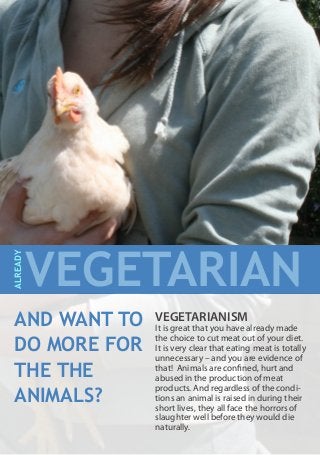
Already Vegetarian and want to do more...
- 1. VEGETARIANISM It is great that you have already made the choice to cut meat out of your diet. It is very clear that eating meat is totally unnecessary – and you are evidence of that! Animals are confined, hurt and abused in the production of meat products. And regardless of the condi- tions an animal is raised in during their short lives, they all face the horrors of slaughter well before they would die naturally. AND WANT TO DO MORE FOR THE THE ANIMALS? VEGETARIAN ALREADY
- 2. DAIRY & EGGS Unfortunately, dairy and egg production cause a lot of the same problems for animals. While both of these products involve the harming of animals, they are also completely unnecessary in maintaining a healthy, nutrient-rich diet. There is evidence of this in the positions of main- stream health organisations such as Dietitians of Canada and the American Dietetic Association, as well as the growing number of people thriv- ing without eating any egg and dairy products. It is a widely held belief that animals are not killed to produce egg and dairy products. Peter Singer and Jim Mason explain why this is wrong in their book The Ethics of What We Eat (pages 255-256): ‘Suppose, however, that you object to the idea of killing young, healthy animals so you can eat them. That ethical view leads many people to become vegetarian, while continuing to eat eggs and dairy products. But it is not possible to produce laying hens without also producing male chickens, and since these male chicks have no commercial value, they are invariably killed as soon as they have been sexed. The laying hens themselves will be killed once their rate of laying declines. In the dairy industry much the same thing happens – the male calves are killed immedi- ately or raised for veal, and the cows are turned into hamburger long before normal old age. So rejecting the killing of animals points to a vegan, rather than a vegetarian, diet’. FIND OUT MORE For information on being vegan in Perth, including health information, vegan-friendly restaurants and products, and much more, go to: www.veganperth.org.au For more information on veganism and animal rights, visit the Animal Rights Advocates website: www.ara.org.au or email info@ara.org.au. BEYOND DIET, OTHER ACTIONS TO HELP ANIMALS What we eat is very important for the animals, but there are many other actions that we can take in our daily lives to reduce the demand for animal suffer- ing and slaughter. Beyond eating a diet free from animal products, other actions that we can take include: • Avoiding buying clothing made from animal- based products such as leather, fur and wool. All of these products involve suffering and death to animals and there are so many animal- free alternatives out there to choose from! • Avoiding buying household products that are tested on animals or contain animal-derived ingredients. There are a growing range of household products free of animal ingredients and testing, which makes avoiding this cruelty easier and easier, as well as demonstrating how unnecessary it is. • Not supporting entertainment involving ani- mals, such as circuses, rodeos or zoos. There is so much entertainment out there free of animal exploitation – please support these instead. • Adopting companion animals, rather than supporting breeders or pet shops. Adopting potentially saves someone from death or life spent in a shelter, rather than contributing to the pet overpopulation problem which leads to animals being killed at, or living out their lives in, shelters.
